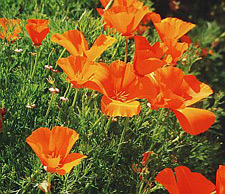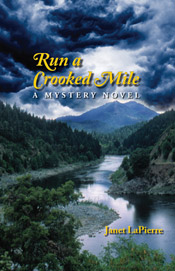Irish proverb: The most beautiful music of all is the music of what happens.
Spring Is Sprung
Spring arrived in Berkeley about two months ago while I wasn't looking. Tied to a computer by an ever-more-elusive story, I walked daily because both Dulcie the yelow labrador and I needed it. But it was heads-down, lost-in-thought walking, sometimes in rain, sometimes against sharp wind, often shielding my eyes from the sharp beams of low winter sunlight. Fog is okay, my favorite weather phenomenon; fog permits, even encourages, inwardness. Not much point in looking around even if you wanted to.
But then spring arrived with a silent clamor. Coastal northern California is almost never truly hot or deeply cold; it has plentiful rain for six months, no rain but quite a bit of fog the other six. Berkeley sits right on San Francisco Bay, and at no time of the year here is there any such thing as bare earth. Unless you pave the ground or cover it with plastic or poison it, something will grow. Your choice is to plant something you like, or live with whatever arrives.
Thus Berkeley is a city of gardens. Not formal gardens, usually; but stuff planted and in some degree cared for. Few plants fail completely here, although it's sensible to pay attention to which ones like sun and which prefer shade; and plants that benefit from at least one good hard frost are less vigorous here, and less fragrant. In the spring, magnolias start things in breath-taking fashion by putting out their large, elegant, creamy or colorful blooms on naked limbs. Cherry trees come next, with dainty blossoms hanging demurely face-down from frail stems; then come plum trees, and dogwoods, and California mountain lilac and other nameless (to me) blossoming shrubs. And the wisterias in various shades of purple (and a few white), some of them so fragrant as to stop a walker in her path to just take several deep breaths. Wisterias love this climate, seem to live forever and can grow strong enough to tear down a less-than-sturdy support.
 Rhododendrons burst into brilliance over two or three months, along with many varieties and sizes of lily. And poppies! California's state flower is treated as a weed by many gardeners, because it intrudes anywhere and goes on blooming for weeks; but they're so beautiful I can't bring myself to pull them up. Roses begin early, in many forms and innumerable colors and blend, and will thrive here so long as they're not too much shaded. However, with a huge park rimming its eastern edge, much of Berkeley is awash in deer, so a rose-lover must build a serious fence. Who knew deer loved roses?
Rhododendrons burst into brilliance over two or three months, along with many varieties and sizes of lily. And poppies! California's state flower is treated as a weed by many gardeners, because it intrudes anywhere and goes on blooming for weeks; but they're so beautiful I can't bring myself to pull them up. Roses begin early, in many forms and innumerable colors and blend, and will thrive here so long as they're not too much shaded. However, with a huge park rimming its eastern edge, much of Berkeley is awash in deer, so a rose-lover must build a serious fence. Who knew deer loved roses?
Gardeners, this non-gardener has learned, tend to discover new plants or new varieties, and soon these discoveries are adopted by other gardeners. So the spring-alert walker will find that a familiar garden has been transformed into, say, a field of spiky plants in ordinary green or odd shades of dark red or bronze. Trees with purple spiky leaves crop up where dogwoods once were, and succulents appear in shapes no sane person could have imagined.
And there are the rebel plant people out there. In front of one house, between the sidewalk and the road, someone obviously strewed wildflower seed across the whole area, watered it regularly and otherwise left it alone. It is messy, cheerful, and very much unlike a garden. And in a very Berkeley fashion, the city employees who regularly clip the tall grass and weeds along a center street divide to make left turns safer did mow the weeds, but could not bring themselves to take out the clumps of blooming poppies.
Ah, Berkeley. My neighborhood is residential, hilly, upscale, attractive in its houses as well as its gardens. Walking is a favorite way of passing time or exercising. Brought back to observing life by spring, I found myself paying attention to my fellow walkers as well as to their gardens. Some observations:
Children are friendly and cheerful, particularly when they see my dog. Teenagers are fairly pleasant, inclined to make space for and eye-contact with a gray-haired walker with dog. This is a bit more true of boys than girls, who are sometimes caught up in conversations of their own. Maybe boys don't talk that much.
Adults vary. Again, men are more inclined to be civil than women. Other gray-heads of either sex will offer smiles and greetings, even a bit of chat. The least civil of all: pairs of women in their forties or early fifties, dressed in leggings or tights with sweaters tied round their waists and striding along in expensive walking shoes. They stay in pairs on the sidewalk rather than settling into single file to make space for on-comers, they continue their loud converstions with each other, they nether smile nor greet. Sometimes, just having pulled myself and my dog to one side to avoid a pair of these, I say fairly loudly, "D-minus."
The other people who fail my personal walker's test: those who don't seem to see my beautiful dog, who is smiling at them. Dulcie is disappointed; I am offended. Not friends of ours, I tell her.
So Berkeley is back to life in its own fashion, and now I'm heading to the mountains, to Trinity County. The wildflowers and blooming plants like dogwoods and redbuds that have finished their spring here will still be vigorous there, and the creeks will be aroar. I'm looking forward to the change; and I'll be interested to notice once again how the people in this sparsely-populated, isolated area differ from my city-folk neighbors. Probably there's a story in the difference.
—Janet LaPierre
Return to the current Music of What Happens
© Janet LaPierre.
